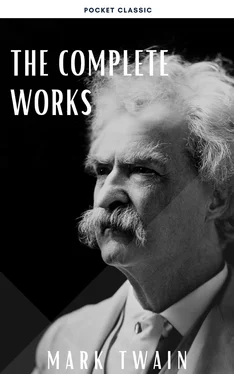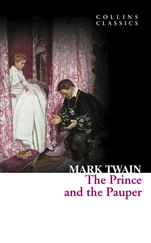Still, hope was as stubborn now as doubt had been before; she could not bring herself to accept the verdict of the test; she must try the thing again—the failure must have been only an accident; so she startled the boy out of his sleep a second and a third time, at intervals—with the same result which had marked the first test; then she dragged herself to bed, and fell sorrowfully asleep, saying, "But I cannot give him up—oh no, I cannot, I cannot—he MUST be my boy!"
The poor mother's interruptions having ceased, and the Prince's pains having gradually lost their power to disturb him, utter weariness at last sealed his eyes in a profound and restful sleep. Hour after hour slipped away, and still he slept like the dead. Thus four or five hours passed. Then his stupor began to lighten. Presently, while half asleep and half awake, he murmured—
"Sir William!"
After a moment—
"Ho, Sir William Herbert! Hie thee hither, and list to the strangest dream that ever … Sir William! dost hear? Man, I did think me changed to a pauper, and … Ho there! Guards! Sir William! What! is there no groom of the chamber in waiting? Alack! it shall go hard with—"
"What aileth thee?" asked a whisper near him. "Who art thou calling?"
"Sir William Herbert. Who art thou?"
"I? Who should I be, but thy sister Nan? Oh, Tom, I had forgot! Thou'rt mad yet—poor lad, thou'rt mad yet: would I had never woke to know it again! But prithee master thy tongue, lest we be all beaten till we die!"
The startled Prince sprang partly up, but a sharp reminder from his stiffened bruises brought him to himself, and he sank back among his foul straw with a moan and the ejaculation—
"Alas! it was no dream, then!"
In a moment all the heavy sorrow and misery which sleep had banished were upon him again, and he realised that he was no longer a petted prince in a palace, with the adoring eyes of a nation upon him, but a pauper, an outcast, clothed in rags, prisoner in a den fit only for beasts, and consorting with beggars and thieves.
In the midst of his grief he began to be conscious of hilarious noises and shoutings, apparently but a block or two away. The next moment there were several sharp raps at the door; John Canty ceased from snoring and said—
"Who knocketh? What wilt thou?"
A voice answered—
"Know'st thou who it was thou laid thy cudgel on?"
"No. Neither know I, nor care."
"Belike thou'lt change thy note eftsoons. An thou would save thy neck, nothing but flight may stead thee. The man is this moment delivering up the ghost. 'Tis the priest, Father Andrew!"
"God-a-mercy!" exclaimed Canty. He roused his family, and hoarsely commanded, "Up with ye all and fly—or bide where ye are and perish!"
Scarcely five minutes later the Canty household were in the street and flying for their lives. John Canty held the Prince by the wrist, and hurried him along the dark way, giving him this caution in a low voice—
"Mind thy tongue, thou mad fool, and speak not our name. I will choose me a new name, speedily, to throw the law's dogs off the scent. Mind thy tongue, I tell thee!"
He growled these words to the rest of the family—
"If it so chance that we be separated, let each make for London Bridge; whoso findeth himself as far as the last linen-draper's shop on the bridge, let him tarry there till the others be come, then will we flee into Southwark together."
At this moment the party burst suddenly out of darkness into light; and not only into light, but into the midst of a multitude of singing, dancing, and shouting people, massed together on the river frontage. There was a line of bonfires stretching as far as one could see, up and down the Thames; London Bridge was illuminated; Southwark Bridge likewise; the entire river was aglow with the flash and sheen of coloured lights; and constant explosions of fireworks filled the skies with an intricate commingling of shooting splendours and a thick rain of dazzling sparks that almost turned night into day; everywhere were crowds of revellers; all London seemed to be at large.
John Canty delivered himself of a furious curse and commanded a retreat; but it was too late. He and his tribe were swallowed up in that swarming hive of humanity, and hopelessly separated from each other in an instant. We are not considering that the Prince was one of his tribe; Canty still kept his grip upon him. The Prince's heart was beating high with hopes of escape, now. A burly waterman, considerably exalted with liquor, found himself rudely shoved by Canty in his efforts to plough through the crowd; he laid his great hand on Canty's shoulder and said—
"Nay, whither so fast, friend? Dost canker thy soul with sordid business when all that be leal men and true make holiday?"
"Mine affairs are mine own, they concern thee not," answered Canty, roughly; "take away thy hand and let me pass."
"Sith that is thy humour, thou'lt NOT pass, till thou'st drunk to the Prince of Wales, I tell thee that," said the waterman, barring the way resolutely.
"Give me the cup, then, and make speed, make speed!"
Other revellers were interested by this time. They cried out—
"The loving-cup, the loving-cup! make the sour knave drink the loving-cup, else will we feed him to the fishes."
So a huge loving-cup was brought; the waterman, grasping it by one of its handles, and with the other hand bearing up the end of an imaginary napkin, presented it in due and ancient form to Canty, who had to grasp the opposite handle with one of his hands and take off the lid with the other, according to ancient custom. This left the Prince hand-free for a second, of course. He wasted no time, but dived among the forest of legs about him and disappeared. In another moment he could not have been harder to find, under that tossing sea of life, if its billows had been the Atlantic's and he a lost sixpence.
He very soon realised this fact, and straightway busied himself about his own affairs without further thought of John Canty. He quickly realised another thing, too. To wit, that a spurious Prince of Wales was being feasted by the city in his stead. He easily concluded that the pauper lad, Tom Canty, had deliberately taken advantage of his stupendous opportunity and become a usurper.
Therefore there was but one course to pursue—find his way to the Guildhall, make himself known, and denounce the impostor. He also made up his mind that Tom should be allowed a reasonable time for spiritual preparation, and then be hanged, drawn and quartered, according to the law and usage of the day in cases of high treason.
At Guildhall
The royal barge, attended by its gorgeous fleet, took its stately way down the Thames through the wilderness of illuminated boats. The air was laden with music; the river banks were beruffled with joy-flames; the distant city lay in a soft luminous glow from its countless invisible bonfires; above it rose many a slender spire into the sky, incrusted with sparkling lights, wherefore in their remoteness they seemed like jewelled lances thrust aloft; as the fleet swept along, it was greeted from the banks with a continuous hoarse roar of cheers and the ceaseless flash and boom of artillery.
To Tom Canty, half buried in his silken cushions, these sounds and this spectacle were a wonder unspeakably sublime and astonishing. To his little friends at his side, the Princess Elizabeth and the Lady Jane Grey, they were nothing.
Arrived at the Dowgate, the fleet was towed up the limpid Walbrook (whose channel has now been for two centuries buried out of sight under acres of buildings) to Bucklersbury, past houses and under bridges populous with merry-makers and brilliantly lighted, and at last came to a halt in a basin where now is Barge Yard, in the centre of the ancient city of London. Tom disembarked, and he and his gallant procession crossed Cheapside and made a short march through the Old Jewry and Basinghall Street to the Guildhall.
Читать дальше










